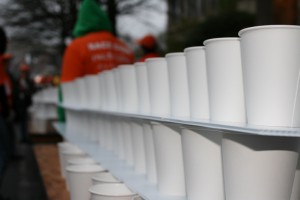How to Avoid the Crowd in Running a Race
Wednesday, September 9th, 2009Stop following the crowd. You’re such a follower. Weave through the crowd and be your own runner. We’ve all been in tight races before when we have to dodge other runners to run the pace we want. The shorter the race, the more important a good start is, so use these tips to ensure you don’t have to alter your stride for anyone. I alter my stride for no one…except roots, rocks, curbs, potholes….
Early Arrival: Arrive at the start line early to get a good spot. Even in races with corrals it can be imperative to be at the beginning of the corral. A typical 10K can have a corral with a range of 36 to 42 minute runners, a whole minute a mile difference between the top runner and the 41:59 qualifying runner. Make sure you position yourself in the right spot of your corral. Cows know how to do it, so why can’t we runners figure it out?
Size it up: If you are in a smaller race without corrals you want to make sure you are starting around runners of the same ability. Size up your competition. Look for a grouping of people who match your age and sex. Then look at what the other runners are wearing. If you are wearing basketball shorts and everyone around you has on short running shorts then you are probably in the wrong group. Or have really embarrassing looking thighs.
Be a FrontRunner: If you know you will be one of the top runners in the race then don’t worry about getting to the start early or sizing anyone up. You’re better than everyone. Just do your stretches, move toward the start line, and begin doing your strides to loosen up. When it’s almost race time and other racers are lining up, just squeeze yourself in the front. If you say “excuse me” you can do anything you want. Just act like you’re the fastest guy or girl out there. Run with swag.
Look in Front of You: If you find yourself in a tight start and a need to weave through the crowd always be looking 10 to 20 feet in front of yourself. Plan your next move and execute it.
Run Sideways: One of the best ways to maneuver your body through a crowd is to move your shoulders perpendicular to your waist to get around someone. I use this move so often in running that I use it in everyday life too. It allows me to walk on the sidewalks a couple of MPH faster than everyone else.
Run on the Sidewalk: In very large races where you are stuck behind slower runners it is perfectly fine to run on the sidewalk. You are probably using more energy than the other runners and traveling the same distance so it’s not cheating. I once ran the first 3 miles of a half marathon on the sidewalk because of a late start due to bathroom issues. I judge a race by how accessible and how long the bathrooms are. I know what’s important to me. Georiga ING: Fail.
Run Alone: Race yourself. Then no one will be in your way and you win everytime!






 If running is 90% mental then why not think about the mental aspect of
If running is 90% mental then why not think about the mental aspect of  On my long run this weekend I ran up behind another runner, in a less than desirable part of town, which made it obvious that we were both on a very long run. As I approached the other runner I could see her waist band full of water bottles and thought to myself, “How far she is going?!” I was personally on a 14 mile run in which the only stop I had planned to make was to release some
On my long run this weekend I ran up behind another runner, in a less than desirable part of town, which made it obvious that we were both on a very long run. As I approached the other runner I could see her waist band full of water bottles and thought to myself, “How far she is going?!” I was personally on a 14 mile run in which the only stop I had planned to make was to release some 